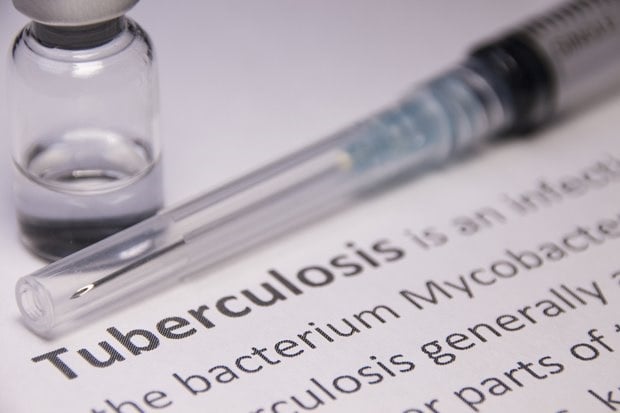
Last year at least 360 000 people in South Africa fell ill with TB and about 58 000 of them died from the disease, according to a World Health Organisation report released last week.
One factor likely contributing to the high number of TB deaths in South Africa is treatment interruptions, or people not completing treatment courses – something that can happen for a variety of reasons.
And the Covid-19 coronavirus pandemic has exacerbated an already alarming situation.
Acknowledging the impact of Covid-19 on the country’s TB and HIV response recently, Health Minister Dr Zweli Mkhize said it was time for South Africa to refocus on these and non-communicable diseases.
In the meantime, measures are in place to get the TB programme back on track.
Fear TB more than HIV
At the Site B Day Hospital in Khayelitsha, Zanele Ndibongo, a community healthcare worker, spends her days calling TB patients who have stopped taking treatment.
Seated at her desk with dozens of files of TB patients, Ndibongo tells Spotlight treatment interruptions are still and “will remain a challenge for many years to come”.
Community healthcare workers track these patients to ensure they get on and stay on treatment. But this is not easy, says Ndibongo. The reasons vary – from people refusing to open their doors or not taking phone calls.
This was the case even before the catch-up plan and the lockdown.
“But at the end of the day our team has to persist because we want them to get better.”
Ndibongo says she finds that people fear TB more than HIV.
Decline in testing
The Western Cape department of health acknowledges the impact Covid-19 has had on the provision of health services to chronic patients.
“Many chronic patients avoided going to clinics for chronic care,” says departmental spokesperson, Monique Johnstone, adding that they have also seen a significant increase inpatients who stopped their TB treatment.In June this year, the province saw a 47% decline in TB testing and a 33% decline in the number of patients diagnosed with TB compared to previous years, says Johnstone.
Read: Good news for patients as TB treatment time is cut by a third
“Our response to chronic disease management, including TB, is being scaled up systematically over the next six months to increase the number of TB cases detected,” she says.
To do this, the department intends launching a project jointly with the National Health Laboratory Service to re-introduce TB testing in the province by looking at the way they are proactively finding people to test for TB, “like we did with Covid-19 community testing and screening”.
“With the help of community healthcare workers, we will go into communities to actively find and screen people for TB as part of our community-oriented primary care approach. We are reviewing our data-led approach to find people who need to be tested for TB,” says Johnstone.
Getting TB patients back on track
Johnstone says a multi-disciplinary team, comprising the department of health and non-profit organisations staff, review TB attendance at primary healthcare facilities and TB patients who did not attend their appointments are identified.
“We also have an electronic system for our community-based services as well as primary healthcare services that we use to flag patients for follow-up visits by the community healthcare worker. A list is compiled of TB patients who need a follow-up visit or who missed their appointments.
“The list is given to the relevant community healthcare workers who will visit the patients. They will ask the patients why they missed their appointment, make sure they are taking their medication and assist the patients to make a new appointment if they have defaulted on their appointment or treatment. The patients will also be screened for Covid-19 and other chronic conditions,” says Johnstone.
She also says targets for door-to-door visits by community healthcare workers are monitored daily and amended where necessary.
“Patients are urged to give their correct contact information so that we can support them in their recovery journeys. If a patient defaulted on treatment or missed an appointment, we ask that they contact their clinic so that we can welcome them back and ensure they receive the appropriate treatment for their condition,” she says.
If someone is on TB treatment or suspect they may have the disease, it is best for them to visit their nearest clinic, advises Khayelitsha and Eastern Substructure communications officer, Sithembiso Magubane.
“A community healthcare worker in their community will then be assigned to them to support them with their treatment and to follow up on them,” Magubane says. “Adherence to treatment is very important to cure TB, control the spread of infection and minimise the development of other serious forms of TB.”
New catch-up plan, old challenges
But, says Magubane, stigma often threatens to derail their efforts. “Stigma is still a major contributing factor to people hiding their status from families and communities, and not taking their medication. Once a person is known to be suffering from TB, then they get isolated.
“No one wants to be close to them because of fear of being infected, and they get labelled and called names. As a result, for fear of stigma, people start to default and act strong and healthy,” she says.
During a visit to Khayelitsha, Spotlight saw first-hand how some TB patients navigate the stigma attached to the disease.
In Site B, Gogo Nozamile’s* coughing can be heard from a distance as we make our way to her house. The Spotlight team is accompanying community healthcare workers Khayakazi Mdiza and Thembakazi Mdyeshana.
They are delivering Gogo Nozamile’s TB medication.
Opening the door, the Gogo’s eyes light up as the community healthcare workers unwrap the medication. She pours a glass of water and gulps down two tablets.
“This is my muthi and I have no other choice but to take these meds if I want to realise my dream of reaching 80,” the 68-year-old says with a chuckle.
She and her son, who is not around during our visit, contracted TB in August and have been religiously taking their medication.
Gogo Nozamile does not want her picture taken.
“No, no, no. Already we are a laughingstock in this community because people still fear this disease. They keep their distance from us because they fear that we might infect them,” she says.
She does however give us permission to tell her story.
The community healthcare workers say daily they face the challenge of having to reassure their patients that TB is a normal disease and that they need not be ashamed of it.
Stigmatising language
TB survivor Phumeza Tisile, who works with the organisation TB Proof, says even the word “default” is stigmatising on its own.
“The correct term will be patients who have stopped taking their TB medication.”
Tisile says there are many factors that make people stop their medication. “For one, some people do not go to the clinic that is close to them, simply because they do not want to be seen by their communities going to the clinic every day for directly observed treatment (Dots). So when they feel better they stop taking their medication all together and stop going to the clinic.”
Tisile says she finds Dots “problematic”.
Read: What is behind SA’s higher TB numbers?
“Patients are already ashamed that they have TB, now they have to deal with being watched while they take their medication,” she says.
Awareness and education can play a vital role. “People need to understand that anyone can get TB as it is an airborne disease. Anyone who breathes can get TB,” she says.
“Now if you have a cough, people just assume that you have Covid-19, and TB testing comes last. There should be mobile clinics and support for those who are on treatment in their homes, community healthcare workers do this so well,” she says.
Tele-medicine approach
During an earlier media conference, head of the Western Cape health department, Dr Keith Cloete, said that based on the lessons learnt from the Virtual Emergency Care Tactical Operation project during Covid-19, it will be expanded to routine health services including TB, diabetes and antenatal services. The project is based on a tele-medicine approach.
The department says it is providing counselling support telephonically for “families who are not comfortable with community healthcare workers entering their homes”.
‘To stay alive, you have to take it’
Tisile, who survived drug-resistant TB that left her temporarily deaf, says she was told more than once that she might die from TB as her chances of surviving were 20%. She survived and had to undergo surgery for cochlear implants to restore her hearing.
“TB is curable. The treatment is horrible, but to stay alive you have to take it. To those who have TB, it is not the end of the world. There’s life after TB,” she says.
“People must continue taking their medication as prescribed, and there’s nothing to be ashamed of when you have TB. I know it is associated with many negative things such as it being ‘a poor man’s disease’. Anyone can get TB. It does not discriminate when it comes to race and socio-economic status.”
* This article was produced by Spotlight – health journalism in the public interest.
NOTE: After Spotlight was contacted by a concerned reader, this article was updated on November 2 to remove the terms default/defaulter/defaulting in all contexts except where it occurs in direct quotations. The Stop TB Partnership has published a useful guide explaining why stigmatising terms like “defaulter” or “TB suspect” should be avoided.
| ||||||||||||||||||||||||||||||
 |




 Publications
Publications
 Partners
Partners











